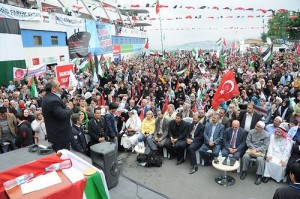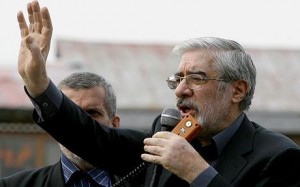
2100 GMT: British Prime Minister David Cameron, speaking in Parliament,
has strongly denounced both the Israeli attack on the Freedom Flotilla and the blockade of Gaza:
What has happened is completely unacceptable. We should be clear about that and we should also deplore the loss of life....We should do everything we can to make sure this doesn't happen again - and I stressed this point in a conversation with President Netanyahu of Israel.... Friends of Israel - and I count myself a friend of Israel - should be saying to the Israelis that the blockade actually strengthens Hamas's grip on the economy and on Gaza, and it's in their own interests to lift it and allow these vital supplies to get through.NEW Gaza Flotilla: A Legal Opinion “The Occupying Power Had to Facilitate the Passage”
NEW Gaza Flotilla Video & Transcript: Hillary Clinton’s Statement (1 June)
Gaza Flotilla: The Text of the UN Security Council Statement
Gaza Flotilla: A Short Note on Why Our “New Media” Are Essential
Blaming the Gaza Flotilla: Text of US Remarks in Security Council
The Flotilla: Has Israel Lost Its Second Gaza War? (Burston)
Gaza Flotilla LiveBlog: The Politics After the Attack (1 June)
1720 GMT: Israeli Prime Minister Benjamin Netanyahu is in the middle of a press conference defending Monday's attack. Calling the Freedom Flotilla a "hate boat", he said, "The State of Israel will continue to practice its right to defend itself. It's important for all of us to be united."
1715 GMT: The Israeli Line. The Israeli military is now realising selective clips from cameras on the
Mavi Marmara to establish that "rioters" initiated the confrontation with the commandos.
I'll leave it to readers to critique the footage, but ask this question: if this is an effort at establishing the "truth" about the attack, rather than propaganda to justify it, why not release all the film from the cameras, rather than this edited, partial clip?
[youtube]http://www.youtube.com/watch?v=HZlSSaPT_OU[/youtube]
1640 GMT:
Hamas has refused Israel's delivery of wheelchairs that were amongst the aid on the Freedom Flotilla. "We refuse to receive the humanitarian aid until all those who were detained aboard the ships are released," said Ahmed Kurd, Minister for Social Welfare. "We also insist that the equipment be delivered in its entirety."
Kurd said that the passage of the wheelchairs was a "deception," claiming that the batteries that operate them had been removed, and was designed to divert attention from Monday's "massacre".
Kurd also welcomed Egypt's decision to reopen the Rafah border crossing.
1635 GMT: The "You Don't Say" Headline of Day. Reuters makes
a surprising discovery, "Experts say Gaza convoy raid may boost militancy".
1625 GMT: Haneen Zoubi, an Arab member of the Israeli Parliament who was on the lead ship of the Freedom Flotilla, said Israeli naval vessels had surrounded the
Mavi Marmara and
fired on it a few minutes before commandos abseiled onto the deck.
Zoubi said passengers were forced off the deck when water was sprayed at them and she was not aware of any provocation or resistance. She added that within minutes of the raid, three bodies were brought to the main room on the upper deck, two with gunshot wounds to the head.
1330 GMT:
In a separate entry, we have posted a legal opinion that the Israeli military was obligated to escort the Freedom Flotilla to a Gaza port.
1325 GMT: Israel's Deputy Defense Minister Matan Vilna'i has told the Israeli Parlimaent, the Knesset that
all nine passengers killed were involved in violent clashes, Deputy Defense Minister Matan Vilna'i said on Wednesday.
Vilna'i praised Israel's commando unit, Shayetet 13, as "unique in the world....While their friends are being lynched....[they were] calling on each other to hold fire."
Vilna'i was heckled by Arab members of the Knesset, six of whom were ejected, and right-wing members, one of whom was removed from the chamber.
1320 GMT: CNN reports that Turkey has informally told the US it will
pull out of a trilateral military exercise planned for August with the US and Israel.
1225 GMT: MV Rachel Corrie Halts Journey. The merchant ship
MV Rachel Corrie is now
going to stop in Crete while the Free Gaza Movement meets tonight to review its journey.
The Movement is reportedly reluctant for the ship to proceed because it does not want the
Rachel Corrie to attract all media attention when there are still activists, including Free Gaza board member Lubna Masarwa, who are still in an Israeli prison.
1210 GMT: More Pressure on Israel. Britain's Deputy Prime Minister Nick Clegg has said, "[The blockade] is
an absolute humanitarian catastrophe, and we should acknowledge it as such, but it is also not in Israel's own long-term self-interest....The blockade on Gaza is neither sustainable nor tenable in its present form."
Turkish Foreign Minister Ahmet Davutoglu says
Ankara is ready to normalise ties with Israel if the blockade is lifted.
1200 GMT: Britain's Channel 4 reports that Irish Minister of Foreign Affairs Michael Martin has called on Israel to
allow the aid ship MV Rachel Corrie to reach Gaza.
As the MV Rachel Corrie sails, the European Campaign to End the Siege on Gaza announced that they received funding for
three more ships as part of a new flotilla "Freedom 2".
1140 GMT: Jack Shenker of
The Guardian of London
reports from the Gaza-Egypt border, "A total of three buses are believed to have made it across from Gaza to Egypt today. An estimated 3000+ people are still waiting."
1130 GMT: Israeli Defense Forces have released a new video, claiming that it shows passengers opened fire at soldiers first.
[youtube]http://www.youtube.com/watch?v=mFGuwUGaI9o&feature=player_embedded[/youtube]
1120 GMT: Limits of Criticism Continue. Turkish political parties have failed to agree on a Human Rights Commission declaration condemning Israel. The opposition party, the Republican Peoples' Party, wanted to add "
Parliament expects economic and military measures against Israel", but the Justice and Development Party rejected the change.
1110 GMT: The Human Rights Commission of the Turkish Parliament, TBMM,
has condemned Israel's raid in
a strongly-worded resolution.
Several hundred Turkish demonstrators, amidst tight securit
y, gathered outside the Israeli Ambassador's residence in Ankara.
1100 GMT: Speaking at the opening of an economic conference in Beersheba, Palestinian Authority leader Mahmoud Abbas has asked the UN Security Council to the lift the blockade on Gaza and to endorse an international investigation of the blockade and Monday's raid on the Flotilla raid. He said that the
Palestinian people are encountering daily occurrences of Israeli terror.
1045 GMT: Defense Minister Ehud Barak welcomed Shayetet 13, the commando unit carried out the operation. He told them that "they did exactly what [they] were supposed to do" and added: "We are not in Western Europe: here there is
no reward for the weak, there is no second chance for those who do not know how to defend themselves."
1030 GMT: Speaking to Army Radio, former Prime Minister
Ehud Olmert said: "The government needs to make a big effort to rehabilitate the political situation with friendly nations that are angry at us and to avoid sinking into isolation. We need to return the situation to what it was not too long ago when we were a friend of the world."
1010 GMT: The UN Human Rights Council is expected to vote on
a draft resolution this afternoon. The resolution harshly condemns Israel and says Israel violated international law when it took over the ships in the middle of the ocean. The resolution also calls on Israel to lift the blockade on Gaza and to supply immediate humanitarian aid to Gaza, in the forms of food, gas, and medications. Similar to the Goldstone Report, it calls for an independent fact-finding mission to investigate international law violations.
1000 GMT: During yesterday's meeting between Secretary of State Hillary Clinton and Turkish Foreign Minister Ahmet Davutoglu, the latter targeted Israel: "Psychologically, this attack is
like 9/11 for Turkey. Turkish citizens were attacked not by terrorists but by a political decision of a state".
0945 GMT: Sherine Tadros of Al Jazeera reports that 77 women, the last female passengers in detention,
will soon be freed. She says about 100 men remain in the Israeli prison.
0907 GMT: Israel has ordered the
families of its diplomats to leave Turkey.
0904 GMT: Journalist Rachel Shabi says
there is still no information on the number of passengers remaining in the Israeli prison, with no access for lawyers. Israel has still not released the names of the dead and injured.
0900 GMT: The BBC has posted the account of Hasan Nowarah, the first British passenger to return from the Freedom Flotilla. Nowarah had been on the attacked lead ship, the
Mavi Marmara, but was moved to another craft before the assault:
As we finished our prayers all we could hear were people screaming, we looked at the Marmara ship and saw the Israeli helicopters dropping soldiers. We heard more screaming and shouting before bullets were fired all over the place.
On our ship we could hear 'tick, tick, tick, tick' around the body of the ship, but they were not real bullets, it turns out it was paintballing guns they were shooting at us.
0700 GMT: Donald Macintyre of The Independent of London
makes a powerful case, "It's Up to Us to Lift the Blockade":
But blaming Israel – and Egypt, which repeatedly enforces closures on Gaza's southern border – for the blockade is too easy. For just as the international ban on talking to Hamas isolated its more pragmatic elements, so the West's tolerance of the siege has strengthened the Islamic faction's more repressive ones, turning Gaza in on itself. A lawful naval relief operation – or even a threat of it that might produce a real easing of what the UN sees as an unlawful blockade – might help to restore international influence over a territory which remains crucial to any settlement in the Middle East. And it would certainly would go a long way to redeeming the West's woeful inaction over the last three years.
0655 GMT: Israel freed 124 of the Flotilla's passengers before sunrise this morning, sending them to Jordan.
0630 GMT: More than 48 hours after the Israeli attack on the Freedom Flotilla, and the battle to open up both the enquiry into the incident and the economic blockade of Gaza continues.
We've posted
the video and transcript of Secretary of State Hillary Clinton's statement as the US Government tries to defend an Israeli --- rather than an "independent" --- investigation of the attack. At the same time, Washington's language on the Israeli blockade has shifted, even if it is set against the perpetual of Israel's security: "The situation in Gaza is unsustainable and unacceptable."
The challenge to Israel may have escalated with Egypt's decision to
open its border with Gaza for the first time in more than a year, as thousands immediately made the crossing. West Jerusalem is trying to hold the line with the statement of an "ongoing dialogue" with the international community over the blockade.
And around the politics circulates the
clash of statements and videos over what happened on Monday aboard the
Mavi Marmara, the lead ship of the Flotilla, as nine passengers were killed. A series of survivors, deported from Israel, gave
vivid testimony of an Israeli attack on unarmed civilians. The Israelis countered by putting forth it
s video version of the clash and the Israeli commando officer who was supposedly thrown over a railing.
 Thursday, June 3, 2010 at 7:28
Thursday, June 3, 2010 at 7:28  Negar Irani provides an English translation of a letter released on Sunday by the detained student leader Majid Tavakoli.
Negar Irani provides an English translation of a letter released on Sunday by the detained student leader Majid Tavakoli. Iran,
Iran,  Majid Tavakoli,
Majid Tavakoli,  Negar Irani in
Negar Irani in  Middle East & Iran
Middle East & Iran 



